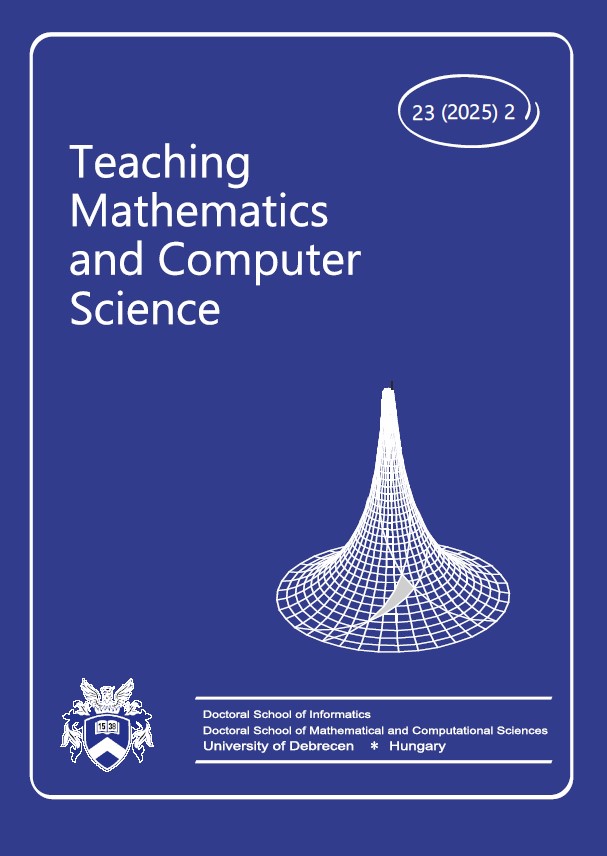Teaching Mathematics and Computer Science (TMCS) is a Diamond Open Access (Diamond OA) journal devoted to disseminating new research and theory in the fields of education of Mathematics and Computer Science. All articles are double-blind peer-reviewed.
Published by the University of Debrecen, Doctoral School of Informatics and Doctoral School of Mathematical and Computational Sciences.
TMCS, founded by Judita Cofman in 2001, was first printed in 2003. Following a model change, in 2019 Teaching Mathematics and Computer Science became Open Access. The Journal's website moved to the OJS platform of the University of Debrecen, and in 2023, TMCS switched from "print+online" to "online only" publishing.
Free Access to Users: Being open access, all content of the Journal is freely available, which means that users are allowed to read, download, copy, distribute, print, search, or link to the full texts of the articles, or use them for any other lawful purpose, without asking prior permission from the publisher or the author(s).
No Charges for Authors: Submission and publication of articles are also free of charge; there are not any administrative fees or other costs (APC) imposed on authors.
Frequency: 2 issues per year (in June and December)
Language: English
ISSN 1589-7389 (Print)
ISSN 2676-8364 (Online)
ISSN-L 1589-7389 (Linking)
DOI: 10.5485/TMCS
Abstracting and Indexing: CrossRef, DOAJ, Jisc (SHERPA/RoMEO), MATARKA, MTMT, ProQuest, Scilit, SciSpace, Ulrichsweb
Institutional Repository: DEA (University of Debrecen Electronic Archive)
Vol. 23 No. 2 (2025) Current Issue
##issue.tableOfContents##
Articles
-
Strategies used in solving proportion problems among seventh-grade students
101-127Views:83In the 2023/2024 school year, 146 seventh-grade Hungarian students (aged 12-13) participated in our classroom experiment on solving proportion problems. At the beginning and the end of the teaching phase, both the experimental and the control groups solved a test. Regarding the answers of the students, in the pre- and post-test mostly consisting of word problems, we examined the success of solving the problems, as well as the solution strategies. For this, we used the strategies of proportional thinking that already exist in the literature of mathematical didactics. We intended to answer the following questions: To what extent and in which ways do the different types of problems and texts influence the solution strategies chosen by the students? How successfully do seventh-grade students solve proportion problems?
Subject Classification: 97D50, 97F80
PDF85 -
Professional Competence in science education
129-137Views:70The article begins with a brief introduction aimed at sensitizing the reader to the perception of a trend in Mathematics and Computer Science Education publications towards empirical studies. Contrary to the stated trend, the characterization of Professional Competence is intended to serve as the guiding concept for the paper. The role of Professional Competence is discussed in various areas incorporating context-relevant publications in consecutive chapters. The discussion starts with the area of material development, covering Educational Standards and ends with Didactic Principles.
Subject Classification: 97xxx, 94xxx
PDF59 -
Self-regulated learning in mathematics lessons at secondary level
139-160Views:88Self-regulation is a prerequisite to be able to set goals and to find suitable ways to reach them. Furthermore, it is an important ability which affects different areas of every day’s life. In educational context, self-regulation is often linked to self-regulated learning. The concept of self-regulated learning as well as key terms related to this topic such as problem-solving and modelling tasks will be discussed, while an emphasis lays on the role of the teacher. In this paper, a study on the attitudes of mathematics teachers towards self-regulated learning is presented. It focuses on teachers’ assessment of the possibility and limitations of self-regulated learning in mathematics lessons. It can be observed that most of the surveyed teachers try to incorporate self-regulatory processes in their teaching, but encounter difficulties related to various factors, such as their students, framework conditions, and the time required for such learning processes.
Subject Classification: 97D10
PDF77 -
Development and assessment of non-cognitive skills among engineering students: a comparison across two universities
161-182Views:105Non-cognitive skills, such as logical thinking and problem solving, are crucial for success in engineering fields. To assess these skills in undergraduate engineering students, we designed a targeted test comprising four different types of tasks. The study was conducted among students at the Faculty of Engineering at the University of Debrecen, and the Faculty of Mechanical Engineering and Informatics at the University of Miskolc. The aim of this paper is to analyze the test results, gather students’ feedback, and examine the strength of the relationships between deductive reasoning, diagrammatic reasoning, and algebraic thinking.
Subject Classification: 97C20
PDF70 -
Apollonea.com project: integrating geometry and collaboration in education
183-194Views:83This article presents the Apollonea.com project, which aims to make the solutions to Apollonius’ problems accessible to students and teachers through modern technology. The web platform contains more than 150 interactive constructions created by students using GeoGebra, allowing for dynamic manipulation and visualization of solutions to various variants of Apollonius’ problems. The project combines classical geometric problems with an interdisciplinary approach, teamwork, and the use of modern technology. The article describes the process of developing the Apollonea.com website, the use of GeoGebra in the project, the structure and functions of the website, and its educational benefits in enhancing students’ geometric skills. The project demonstrates how traditional mathematics education can be connected with modern ICT tools.
Subject Classification: 97U50, 97G40, 51M04, 68U05
PDF72 -
On the nine-point conic of hyperbolic triangles
195-211Views:104In the Cayley–Klein model, we review some basic results concerning the geometry of hyperbolic triangles. We introduce a new definition of the circumcircle of a hyperbolic triangle, guaranteed to exist in every case, and describe its main properties. Our central theorem establishes, by means of purely elementary projective geometric arguments, that a hyperbolic triangle has a nine-point conic if and only if it is a right triangle.
Subject Classification: 51M09
PDF83







